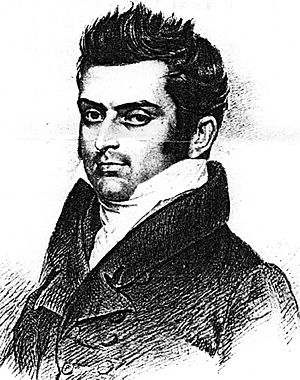Clarke Abel facts for kids
Quick facts for kids
Clarke Abel
|
|
|---|---|
 |
|
| Chief Medical Officer and Naturalist of the British Embassy to China | |
| In office 1816–1817 |
|
| Monarch | George III |
| Personal details | |
| Born | 5 September 1780 |
| Died | 24 November 1826 Cawnpore, India |
| Nationality | British |
| Occupation | Surgeon, naturalist |
| Known for | Accompanying Lord Amherst on his mission to China, being the first Western scientist to report the presence of the orangutan on the island of Sumatra |
Clarke Abel (born September 5, 1780 – died November 24, 1826) was a British surgeon and naturalist. A surgeon is a doctor who performs operations. A naturalist is a scientist who studies nature, like plants and animals.
Contents
A Journey to China
Clarke Abel joined Lord Amherst on a special trip to China in 1816. He was the main doctor and a scientist for the group. This trip was Britain's second try to set up official relations with China.
Exploring China
During the trip, Abel traveled to Beijing and visited the famous botanical gardens of Fa Tee (Huadi) near Canton. While in China, he collected many different plant samples and seeds. One of these plants was later named Abelia chinensis after him.
A Difficult Trip Home
On the way back to Britain, Abel faced some bad luck. His ship was in a shipwreck, and then pirates attacked. Because of these events, he lost almost all of the plant samples he had collected.
Abel wrote a book called Narrative of a Journey in the Interior of China in 1818. In this book, he shared all the details about losing his valuable collection. Luckily, he had left some samples with Sir George Staunton in Canton. Sir George was kind enough to send them back to Abel. The Chinese Abelia plant we see today was later brought to the West by another explorer, Robert Fortune, in 1844.
Scientific Achievements
Clarke Abel was recognized for his scientific work. In March 1819, he became a Fellow of the Royal Society. This is a very important group for scientists in Britain. He was also a member of the Geological Society, which studies Earth's rocks and history.
Discovering New Animals
Abel was the first Western scientist to report seeing an orangutan on the island of Sumatra. An orangutan is a type of great ape. Because of his discovery, a type of Sumatran Orangutan, Pongo abelii, was named after him.
He also became the chief surgeon for Lord Amherst again when Lord Amherst became the Governor-General of India. Sadly, Clarke Abel died in Cawnpore, India, on November 24, 1826, when he was only 46 years old.
Abel was also the first scientist to describe the Chiru, also known as the Tibetan Antelope, in 1826. This unique animal is the only member of its group, called Pantholops.
Plants Named in His Honor
Other scientists have also named plants after Clarke Abel.
- In 1919, a botanist named Takenoshin Nakai published about Abeliophyllum. This is a group of shrubs from Korea that belongs to the olive family.
- Then, in 2010, another scientist named Landrein published about Diabelia. This is a group of shrubs from China and Korea.
 | Anna J. Cooper |
 | Mary McLeod Bethune |
 | Lillie Mae Bradford |

